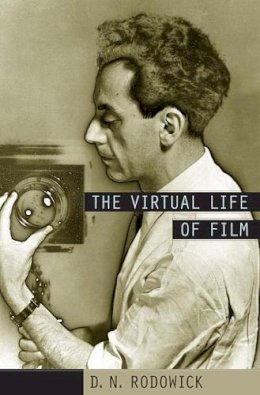
Virtual Life Of Film
D. N. Rodowick
As almost (or, truly, virtually) every aspect of making and viewing movies is replaced by digital technologies, even the notion of “watching a film” is fast becoming an anachronism. With the likely disappearance of celluloid film stock as a medium, and the emergence of new media competing for an audience, what will happen to cinema—and to cinema studies? In the first of two books exploring this question, D. N. Rodowick considers the fate of film and its role in the aesthetics and culture of moviemaking and viewing in the twenty-first century.
Here Rodowick proposes and examines three different critical responses to the disappearance of film in relation to other time-based media, and to the study of contemporary visual culture. Film, he suggests, occupies a special place in the genealogy of the arts of the virtual: while film disappears, cinema persists—at least in the narrative forms imagined by Hollywood since 1915. Rodowick also observes that most so-called “new media” are fashioned upon a cinematic metaphor. His book helps us see how digital technologies are serving, like television and video before them, to perpetuate the cinematic as the mature audiovisual culture of the twentieth century—and, at the same time, how they are preparing the emergence of a new audiovisual culture whose broad outlines we are only just beginning to distinguish.
Product Details
About D. N. Rodowick
Reviews for Virtual Life Of Film
Vivian Sobchack, Professor of Film, Television and Digital Media, University of California, Los Angeles Calmly, intrepidly, Rodowick dives straight into the churning waters of The Virtual Life of Film. Just as cinema anchors new media, so film theory anchors these philosophical speculations that dare to imagine the digital untethered. Neither apocalyptic nor nostalgic, Rodowick appears equipoised as he explores what's behind and in front of this brave new media world.
Dudley Andrew, R. Selden Rose Professor of Film and Comparative Literature, Yale University Over the years Rodowick has provided perhaps the most thorough readings and evaluations of contemporary, post-classical film theory any scholar has offered. The Virtual Life of Film offers his speculations about cinema's digital transformation. An important work, it raises vital issues...In the opening chapters Rodowick offers one of the most nuanced and complex descriptions of the photographic in cinema ever presented.
Tom Gunning
Film Comment
There is much to stimulate, provoke and argue within a book that successfully taps into the scholarly Zeitgeist.
Ian Christie
Times Higher Education Supplement
